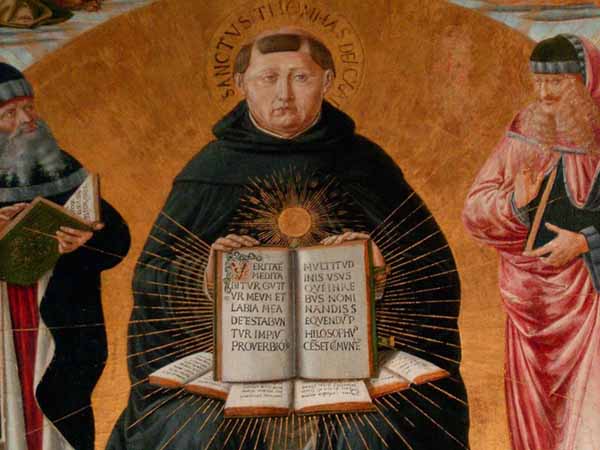Blast From the (Medieval) Past
Posted by Andrew Haines in Church Fathers, Saints, Theology on 12.08.2008
According to some, Thomas Aquinas is making a comeback. And I would tend to agree.
Now, call me biased—sure I might have written a few (dozen) essays on the guy. But I'm definitely not the only one enthralled with St. Thomas Aquinas nowadays. In fact, in the words of Archbishop Jean Louis Bruguès, secretary of the Congregation for Catholic Education, the 13th century Thomas' "theory of virtue will stimulate a renewal of moral theology." And that's no vain claim; I believe it.
As a student of philosophy (and dabbler in theology) Aquinas is one of the big hitters, hands down. While the Church has no official philosophical position, perhaps the closest we'll ever come is that of Thomas. His prolific writing is unsurpassed in the philosophical/theological world even today, and the scope of his focus amazes even the most reborn Renaissance men. Moreover, his endeavors into the world of theology (and particularly moral theology) have proven remarkable. The Thomistic 'natural law' theory was revolutionary at its inception, and still holds water 800 years later. But perhaps what's most interesting about the Angelic Doctor's reputation: he can take a lickin' and keep on tickin'.
"Moral theology based on St. Thomas Aquinas is among one of theology's most popular branches today, says [Archbishop Bruguès], but this popularity has come about only after decades of disdain." (Zenit) Indeed, after a long run in seminaries and theological faculties the world over, Thomas suffered a fall from popular grace, culminating in the hectic 1960s. Certainly, Aquinas' dogmatic stances on reality in relation to the faith were not welcomed in the ever secularizing academic environment of the neo-Enlightenment. But the reinvigoration of moral theology in the later part of the 20th century provided a window of return for the neglected Doctor. "[B]y the beginning of the 80s, many issues referring to ecology and the development of medical techniques began to be at the center of attention of bioethics." This ethically-charged atmosphere proved a capital opportunity for Thomas' reintroduction into academia. "Moral theology was becoming the most appreciated subject, the only branch of theology that was really taken into account in a secularized society."
Now, its tempting to think that Thomas Aquinas is more popular than ever. Sure, he's just as unpopular as ever with those who disagree with him, but for those looking toward the classical foundations of ethics (especially for the sake of bioethics and like fields), there is nothing quite like the clear thought of this medieval monk (who, incidentally, is famous for having had six scribes writing simultaneously on six different treatises!) Of course we've all heard of Thomas, but how many of us have actually read him? This might be a good chance to jump on the orthodoxy bandwagon, run to your nearest Amazon.com and pick up a copy of the Summa Theologiae. (Or, if you prefer, you can just read it online. Latin anyone?)
This entry was posted on 12.08.2008 at 7:20 AM and is filed under Church Fathers, Saints, Theology. You can follow any responses to this entry through the RSS 2.0. You can leave a response.



Post a Comment